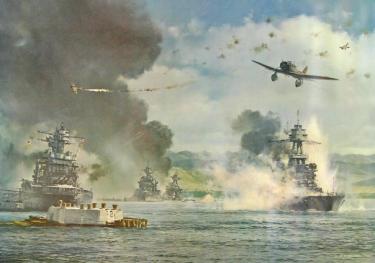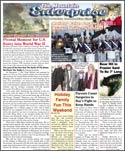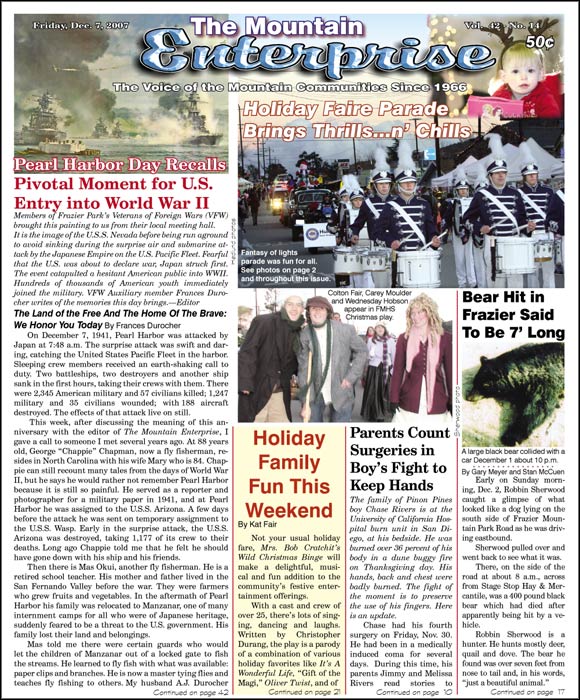Members of Frazier Park’s Veterans of Foreign Wars (VFW) brought this painting to us from their local meeting hall. It is the image of the U.S.S. Nevada before being run aground to avoid sinking during the surprise air and submarine attack by the Japanese Empire on the U.S. Pacific Fleet. Fearful that the U.S. was about to declare war, Japan struck first. The event catapulted a hesitant American public into WWII. Hundreds of thousands of American youth immediately joined the military. VFW Auxiliary member Frances Durocher writes of the memories this day brings.-Editor
The Land of the Free And The Home Of The Brave: We Honor You Today
By Frances Durocher
On December 7, 1941, Pearl Harbor was attacked by Japan at 7:48 a.m. The surprise attack was swift and daring, catching the United States Pacific Fleet in the harbor. Sleeping crew members received an earth-shaking call to duty. Two battleships, two destroyers and another ship sank in the first hours, taking their crews with them. There were 2,345 American military and 57 civilians killed; 1,247 military and 35 civilians wounded; with 188 aircraft destroyed. The effects of that attack live on still.
This week, after discussing the meaning of this anniversary with the editor of The Mountain Enterprise, I gave a call to someone I met several years ago. At 88 years old, George "Chappie" Chapman, now a fly fisherman, resides in North Carolina with his wife Mary who is 84. Chappie can still recount many tales from the days of World War II, but he says he would rather not remember Pearl Harbor because it is still so painful. He served as a reporter and photographer for a military paper in 1941, and at Pearl Harbor he was assigned to the U.S.S. Arizona. A few days before the attack he was sent on temporary assignment to the U.S.S. Wasp. Early in the surprise attack, the U.S.S. Arizona was destroyed, taking 1,177 of its crew to their deaths. Long ago Chappie told me that he felt he should have gone down with his ship and his friends.
Then there is Mas Okui, another fly fisherman. He is a retired school teacher. His mother and father lived in the San Fernando Valley before the war. They were farmers who grew fruits and vegetables. In the aftermath of Pearl Harbor his family was relocated to Manzanar, one of many internment camps for all who were of Japanese heritage, suddenly feared to be a threat to the U.S. government. His family lost their land and belongings.
Mas told me there were certain guards who would let the children of Manzanar out of a locked gate to fish the streams. He learned to fly fish with what was available: paper clips and branches. He is now a master tying flies and teaches fly fishing to others. My husband A.J. Durocher learned fly fishing from both of these men.
Lucy Testa of Pine Mountain remembers 1941 as the year her two brothers left from Gloversville, New York, for the service. She was 11 years old and pretended to be asleep when they left home on furlough. She knew that they were going to be shipped to the South Pacific. Their town, as well as many other small towns in the U.S.A., were stripped of the young men who were physically fit to go to war. One brother, Tony Viola, was sent to Clark Air Force Base in the Phillipines. Ralph Viola was in the Army field artillery corps. By 1945, he was being trained to establish a beachhead for United States forces in Japan, before the first atomic bomb was dropped.
Doris Moffit, with the V.F.W. Post 9791 in Frazier Park, tells the story of her uncle, Mark Hall.
He joined the Navy in 1940 and after Officers Candidate School was assigned to the U.S.S. Arizona to be stationed in Pearl Harbor. On the morning of December 7, 1941, he had been home with his family in Pearl, when the sirens went off.
He jumped into his car and raced to his ship just in time to see it sinking. He decided then that the Navy was too dangerous, so he transferred to the Air Force.
Mark made that his career for 30 years. He retired from the Pentagon as Executive Officer to the Air Force Chief of Staff. Doris’ father, Cecil Poff, was a young Army Sergeant stationed at Scoffield Barracks in Honolulu, Hawaii.
He witnessed the attack on Pearl. After being wounded in the Pacific Theater and taken to El Paso, Texas to recover, he married Doris’ mother and made the Army his career.
These are just a few of many stories on the minds of people here on the mountain this week as this anniversary date rolls around.
We should never forget the effects of war on people. The life-altering changes last forever. This week’s anniversary is a time to honor and recognize our Veterans of World War II.
Frances Durocher is a V.F.W. Auxiliary member and daughter of Joe Jaimes Rosales, a soldier who fought in France and Germany during World War II.
This is part of the December 07, 2007 online edition of The Mountain Enterprise.
Have an opinion on this matter? We'd like to hear from you.



